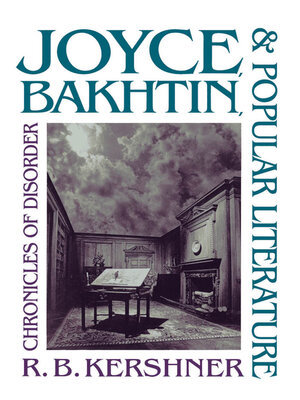
Sign up to save your library
With an OverDrive account, you can save your favorite libraries for at-a-glance information about availability. Find out more about OverDrive accounts.
Find this title in Libby, the library reading app by OverDrive.



Search for a digital library with this title
Title found at these libraries:
| Library Name | Distance |
|---|---|
| Loading... |
The sheer mass of allusion to popular literature in the writings of James Joyce is daunting. Using theories developed by Russian critic Mikhail Bakhtin, R. B. Kershner analyzes how Joyce made use of popular literature in such early works as Stephen Hero, Dubliners, A Portrait of an Artist as a Young Man, and Exiles. Kershner also examines Joyce’s use of rhetoric, the relationship between narrator and protagonist, and the interplay of voices, whether personal, literary, or subliterary, in Joyce’s writing.
In pointing out the prolific allusions in Joyce to newspapers, children’s books, popular novels, and even pornography, Kershner shows how each of these contributes to the structures of consciousness of Joyce’s various characters, all of whom write and rewrite themselves in terms of the texts they read in their youth. He also investigates the intertextual role of many popular books to which Joyce alludes in his writings and letters, or which he owned — some well known, others now obscure.
Kershner presents Joyce as a writer with a high degrees of social consciousness, whose writings highlight the conflicting ideologies of the Irish bourgeoisie. In exploring the social dimension of Joyce’s writing, he calls upon such important contemporary thinkers as Jameston, Althusser, Barthes, and Lacan in addition to Bakhtin. Joyce’s literary response to his historical situation was not polemical, Kershner argues, but, in Bakhtin’s terms, dialogical: his writings represent an unremitting dialogue with the discordant but powerful voices of his day, many inaudible to us now.
Joyce, Bakhtin, and Popular Literature places Joyce within the social and intellectual context of his time. Through stylistic, social, and ideological analysis, Kersner gives us a fuller grasp of the the complexity of Joyce’s earlier writings.
In pointing out the prolific allusions in Joyce to newspapers, children’s books, popular novels, and even pornography, Kershner shows how each of these contributes to the structures of consciousness of Joyce’s various characters, all of whom write and rewrite themselves in terms of the texts they read in their youth. He also investigates the intertextual role of many popular books to which Joyce alludes in his writings and letters, or which he owned — some well known, others now obscure.
Kershner presents Joyce as a writer with a high degrees of social consciousness, whose writings highlight the conflicting ideologies of the Irish bourgeoisie. In exploring the social dimension of Joyce’s writing, he calls upon such important contemporary thinkers as Jameston, Althusser, Barthes, and Lacan in addition to Bakhtin. Joyce’s literary response to his historical situation was not polemical, Kershner argues, but, in Bakhtin’s terms, dialogical: his writings represent an unremitting dialogue with the discordant but powerful voices of his day, many inaudible to us now.
Joyce, Bakhtin, and Popular Literature places Joyce within the social and intellectual context of his time. Through stylistic, social, and ideological analysis, Kersner gives us a fuller grasp of the the complexity of Joyce’s earlier writings.







